John Janaro's Blog, page 115
September 16, 2020
Time and Memory: Encountering a New Humanity (Part 2)
 I want to remember again those days, weeks, and months from thirty years ago.
I want to remember again those days, weeks, and months from thirty years ago.Many of the things I remember from the year 1990 impress upon me a sense of nostalgia. They seem recent and familiar, but then distant and antiquated. There is a spectrum of memories of places, environments, music, work, books, theories, news, political problems, weather - sights, sounds, smells, feelings of expectation, enthusiasm, accomplishment, dread, embarassment, boredom.
I feel like I can practically inhabit my skin from back then, and yet ... where did it all go? It's so "strange," this business of being human. What is time and memory? What is this "me" through which so much passes and apparently vanishes and yet also somehow "remains"? And time keeps going on and on, and the person reaches out for things, gains them, loses them, begins again, has sorrows and joys, and always yearns for more, and then ... dies?
Maybe we appeal to belief in the immortality of the soul and "the afterlife" - okay, but what is all the hum and scrum and bother of this life all about? Does it really matter? The sage and the cynic say, "no," but for different reasons. We look to religion to tell us the things that do matter in this life, and we feel like we can come away with a (hopefully manageable) "list of things that matter." But then it seems we are left with "the-other-99%-of-life" to fiddle around with, scramble through, or endure aimlessly ... But then why do we find so much in life fascinating? Why do there seem to be so many "important things" in this (utterly?) perishable world? And why are even the little peculiarities so endearing?
The would-be "religious person" might be tempted to try to check off the boxes on the list of obligations and prohibitions, and then - with regard to the rest of life in this world - stay disengaged, cold, "safe," mediocre (this is a caricature of a genuine religious attitude, of course, but it's easy to slip into it).
Why am I alive in this world? The particularities of time and memory, aspirations and disappointments, people and relationships, eating and drinking, living and dying - what is the point of all of it? How is it connected to my ultimate destiny? Why does the past still move me as if it is not yet fulfilled (or disturb me as ruptured and in need of healing)? If we are made for happiness, why must we pass through so much suffering?
There are responses to these questions that, after more than half a century of living, I can articulate in various ways (from the Catechism, from theology, from philosophy) and those articulations do matter very much. But words alone are not enough, because these questions remain on an existential and personal level. That is to say, they come from "the guts" of my life and they indicate the mystery of who I am and what reality is, the mystery that is intimate yet elusive, and that moves me to continue in the hope that things do "fit together" in the end, that "all of it" has meaning.
And, one more question: "What does all of this have to do with 1990 in particular?" Well, something happened to me in that year. It wasn't that I "found answers" that removed the drama from, or neutralized, these questions. Rather, I found help in "living these questions" within my faith, within my relationship with Jesus Christ. I found a place where, even now, I can continue to face these questions with greater intensity...
Central to my life is this "relationship with Jesus Christ," because it isn't a thought subject to my control that gives meaning to everything in my life. It isn't an ideology that gives meaning to my life.
It is a Person. Life is about a relationship with a Person I encounter in my own history. The Mystery who is the Source of all reality and the Source of me - who is "within" me and "beyond" me in a manner I cannot comprehend - has come to meet me and be present in my life, to reveal Himself as my destiny and my life as a journey toward His fullness, a journey in which He accompanies me.
The Mystery became flesh, so that He could look upon me with a human face and love me and engage my life with human gestures. This is Jesus Christ living and acting through His people, the Church - Jesus drawn close to my humanity, "dwelling" with me (and there is room for every aspect of Catholic ecclesiology here).
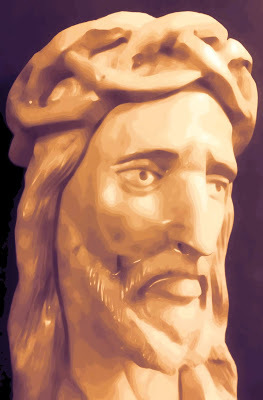 He entered the history of my life in an original and unrepeatable way on March 10, 1963 - the day of my baptism. It is an encounter that has deepened in many significant ways over the years. In 1990, I was renewed in this meeting with Him through a group of friends who were then at Catholic University of America. They have helped me, and continue to help me to journey with Jesus in the Church and to hope for the fulfillment and transformation of the whole of my life. With them I learned to seek the face of Jesus and to ask to discover anew His companionship through all of the persons He has entrusted to me, in all of the places and circumstances of my life each day.
He entered the history of my life in an original and unrepeatable way on March 10, 1963 - the day of my baptism. It is an encounter that has deepened in many significant ways over the years. In 1990, I was renewed in this meeting with Him through a group of friends who were then at Catholic University of America. They have helped me, and continue to help me to journey with Jesus in the Church and to hope for the fulfillment and transformation of the whole of my life. With them I learned to seek the face of Jesus and to ask to discover anew His companionship through all of the persons He has entrusted to me, in all of the places and circumstances of my life each day.To ask for the grace to recognize Him, remember Him, trust in Him... more and more: this is the way of living and praying and following Him that I began to learn in a very particular way in 1990. Though I have learned very little, forgotten too much and too often, and have not been very coherent with what it proposes, it remains my way even now.
Thus, over the past thirty years I have belonged to the "ecclesial movement" founded by Monsignor Luigi Giussani that is called (in English) Communion and Liberation. If you have heard of it, you might be wondering, "Oh, is that still around?"
Well, I'm happy to say that CL is still very much around.
It has been a long time since the days when the once-"new" predominantly lay movements and groups were getting lots of attention and even enthusiasm from the Catholic press. A lot has happened since those days. We have indeed learned that not all that was "glittering" in the Church at that time was in fact "gold."
But there was much that was (and remains) good and genuine and constructive to the witness of the Church. The Holy Spirit poured out abundant gifts on God's people during the past century - gifts that were profoundly suited to the unprecedented times of the emerging global epoch and the evangelical renewal proclaimed by the Second Vatican Council.
Some of these "charisms" have generated new religious congregations or other specifically structured forms of supporting Christian life and witness into the new millennium. Others have brought about certains "styles" or accents of Spirit-filled living within a variety of diverse contexts. These latter tended (in varying degrees) to involve more flexible organization, different levels of commitment, and a very wide scope for the drama of our human freedom and responsibility which are personally attracted, engaged, and offered possibilities by the mysterious workings of God's grace.
CL is definitely in this latter category of charisms. This does not imply that it is not challenging and awesome and "demanding" - we are, as I said, talking about a way of living our relationship with Jesus.
It is a great way, that provokes every aspect of life, but it does so with immense respect for freedom and the dignity of the person along with an abundant witness to the forgiveness and mercy of Christ.
Thus even with all my negligence and incoherence, I find that it is possible for me to stay. It is even possible to be changed, slowly, beyond the stiffness of all my anxieties and the clenched teeth of all my stubbornness.
[...to be continued.]
Published on September 16, 2020 20:10
September 14, 2020
Exaltation of the Holy Cross
Published on September 14, 2020 20:49
September 13, 2020
Jesus Changes Our Experience of Life
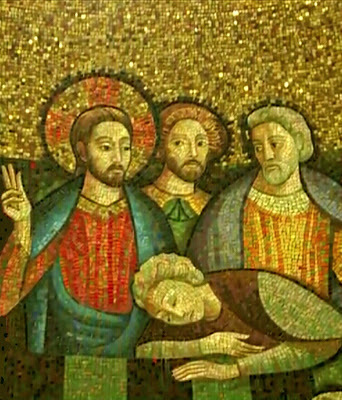 When we encounter Jesus and begin to follow him in the Church, our way of perceiving, judging, and valuing reality starts to change.
When we encounter Jesus and begin to follow him in the Church, our way of perceiving, judging, and valuing reality starts to change.We may not "notice it" so much (at first) or reflect on it beyond the particular "practices" that we take up as the most obvious dimension of our response to him. Our feelings about ourselves and our lives do not necessarily become warm, fuzzy, and comfortable, or exhilarated and self-consciously zealous. Or perhaps, we have an initial emotional enthusiasm that doesn't continue in the same way after a while. We certainly do not find our actions instantly rendered coherent with the Sermon on the Mount.
Nevertheless, the Spirit is at work in us, inviting us to move forward on the path toward God's kingdom, and also healing us and deepening our adherence to Christ in mysterious but very real ways.
Msgr Luigi Giussani always emphasized the impact of this change on our humanity. The journey of faith makes you a new creature, who has "the dignity, the certainty of your destiny and the capacity to operate in a new and more human way." This new humanity means "A different experience of the sentiment of yourself, a different perception of things, a different emotion of the presence of others, a different impetus and density in relationships, a different gusto in the troubled dynamic of work, an outcome that was inconceivable, unimaginable before."
Published on September 13, 2020 20:38
September 11, 2020
Remembering 9/11: Overcoming "Hatred of the Human"
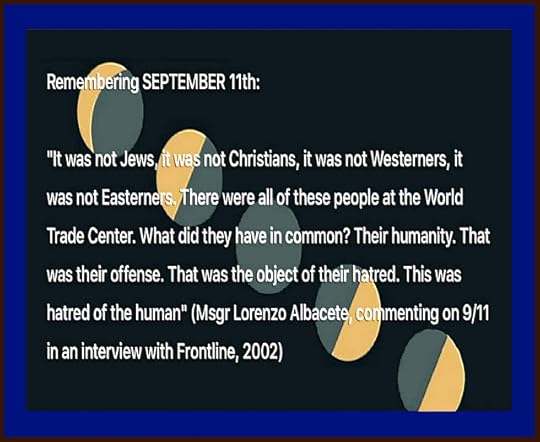
The attacks of September 11, 2001 were rightly described by the late Lorenzo Albacete as springing from and expressing "hatred of the human." The dawn of the 21st century was marked by this new and awful turn in the "cycle of violence" that continues to wreak havoc all through the earth.
Violence begets violence. It feeds into the mayhem of destruction, the drive of a ferocious resentment that would - were it possible - unmake being itself.
Violence is ultimately the enactment of hatred for the human person, for humanity, for reality-as-gift, for the mystery that always transcends the grasp of individual ego, collective pride, and the arrogance of the logic of power.
Let us never forget September 11, 2001. And let us rededicate ourselves, again and again, to opposing the violence in the world and in our own selves by a renewed sense of wonder, gratitude, and desire for the good.
Let us make space in our hearts, our families, and our communities for the recognition of the dignity of every human person, for the awareness that we have been entrusted to one another as brothers and sisters, for the giving and receiving of authentic love. This will nourish the impetus for mutual understanding, forgiveness, justice, equity, solidarity, and the appreciation of all the diverse gifts and riches of our common humanity.
Published on September 11, 2020 20:11
September 10, 2020
Christina Grimmie: The Brightest Stars Burn With Love

Christina Grimmie was a bright beautiful star who gave her whole heart in all that she accomplished in her brief life, to her very last moment. Today I honor her memory (after four years, three months) and next week her family and musical collaborators will be bringing out a new song from the still-substantial archive of her unreleased material.
Here is my usual "10th-of-the-month" bit of digital graphic art. I have taken some phrases from the upcoming song "Cry Wolf," seemingly out of context since the song (like so many pop songs) is about a broken human relationship.
In fact, when Christina wrote songs on these themes, she often accented the experience of suffering that comes from dishonesty and superficiality. This highlights how important truth and candor are to human relationships, and how we are disappointed and hurt when these characteristics proper to the reality of existence are lacking in interactions between people.
Artistic expressions of such painful human stories, however, can touch the poignancy of their distress and open possibilities for the recognition of a deeper meaning energing from them. Songs about betrayal, lies, and heartbreak affect us because they take bad experiences and help us to find new and creative connections with truth and beauty, with the justice we desire and the joy we refuse to give up on.
This reflects the whole of reality.
Evil and violence do not have the "last word" in defining the value of life. Love has the "last word." Love will always have the last word. Day by day, I (slowly) grow in confidence of this - in the face of whatever may come - and Christina's witness is real help to me.
Her star continues to burn brighter as time passes. She remains a light, through her signature gesture of welcoming (this work of mercy so necessary in our world today), the inner "hospitality" that she directed toward those who needed companionship, the respect she had for their dignity, her powerful and authoritative sense of the worth of the person, and the gratitude for existence that always moved her beyond her own fears.
Christina Grimmie is lighting up the way for us and filling us with hope and courage to give our hearts, generously and without hesitation to those who need our love.
Published on September 10, 2020 20:53
September 8, 2020
Happy Birthday to Our Beautiful Mother Mary!❤
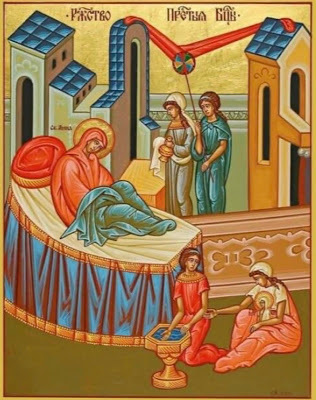 Happy Birthday to the Blessed Virgin Mary, mother of our Lord and mother of all of us who are His little brothers and sisters!
Happy Birthday to the Blessed Virgin Mary, mother of our Lord and mother of all of us who are His little brothers and sisters!The Byzantine tradition is rich with iconography of Mary’s nativity (often in this form of presentation, with Mary and an attendant on the lower right and her mother Saint Anne on the couch and Nazareth in the background).
Nine months ago we celebrated Mary's immaculate conception — we believe that she was preserved from original sin from the first moment of her existence in view of the saving merits of her Son. She is therefore "redeemed" and "saved" wholly and entirely from the beginning of her life. Her birth, therefore, is a unique and joyful epiphany of grace in salvation history.
Though not presented explicitly in Sacred Scripture, the significance of Mary's birth is handed down from the early Fathers of the Church and ancient sources, and it is entirely consistent with her unparalleled mission as it is recounted in the brief but vivid details of the Gospels.
Mary is the first light heralding the dawn of our salvation through her Son. She is the morning star, full of light, the “Panagia,” the All-Holy one prepared in advance by the grace of her Son to be a pure dwelling place for God the Word who would take our flesh in her womb. Mary is the All-Holy, Immaculate Mother, whose heart is united to her Son, and therefore is “large enough” for each and every one of us. She is our mother who knows our hearts and our sorrows. She draws us together with Jesus our Savior and with one another.
Don’t be afraid to entrust everything to her, because through her you encounter Jesus, the Word truly made flesh, our God and our brother!
“Blessed are you, holy Virgin Mary, deserving of all praise; from you rose the sun of justice, Christ our God" (Gospel Antiphon).
Published on September 08, 2020 16:21
September 7, 2020
The Person of Jesus Gives Me the Truth of Myself
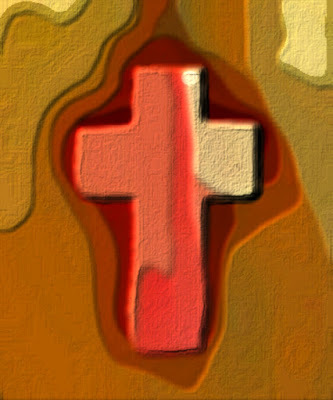 Saint Paul famously declared: "I no longer live; Christ lives in me" which means that "I live in faith in the Son of God who loved me and gave Himself for me" (Galatians 2:20).
Saint Paul famously declared: "I no longer live; Christ lives in me" which means that "I live in faith in the Son of God who loved me and gave Himself for me" (Galatians 2:20). Do we Christians view our lives in this way?
There are times (fewer than I would like to admit) when I really do remember that I belong to Jesus, that the source of my identity and the energy that draws me to seek and build the good is His love and mercy.
Living faith is trust, and that requires me to realize that the source of my life is something more than a man who lived and died two thousand years ago. Jesus is the Risen One, glorified at the Father's right hand. He lives. He loves me and gives Himself to me now. There are moments when I remember this truth, this real fact that defines me and that defines reality right now.
But too often, it slips away from the present. Somehow, the truth of "Jesus loving me in this moment" subtly turns into "the Christian worldview" or "the Christian system of thought." These latter things, of course, have their place as aspects of living with Jesus, knowing and loving Jesus, following Him in the Church, and witnessing to Him in the world.
The problem comes when they become a substitute for the awareness of belonging to Jesus, of being in a relationship with the Person of Jesus who is present in my life, who is working by the power of His Spirit to make me an adopted son of the Father. When "Christian thought" loses its vital connection with the Person of Jesus, it atrophies. It becomes my system, my project, my way of defining myself.
It's so easy to become a member of the "Christian party," to fight for "Christian ideas," or even to discourse on things like love, mercy, and presence (such as I am doing right now) and forget all about the Person of Jesus Christ! I can so easily live as if He doesn't exist, which means, of course, that I live in the presumption that everything depends on me.
Which, means, ultimately, that I am alone...
I am not saying that it is necessary to constantly conjure a picture of Jesus in my mind, or be obsessed with explicitly thinking about Him at every moment. No. This relationship is a living reality, an intimacy, which entails an attachment of the heart, an impetus for love.
He loves me and gives Himself for me: this is what constitutes the real value of my "self." How much do I live this and depend on it? Very little. I live in forgetfulness and distraction.
But He never forgets.
The only way to grow in this awareness is to pray. "Jesus deepen my awareness of Your presence in my life. Deepen my trust in You."
Published on September 07, 2020 15:10
September 5, 2020
Mother Teresa: "The Hunger For Love..."
Mother Teresa understood the need for love, the longing that cries out from the boundless depths of every human heart. That's what made her so unique.
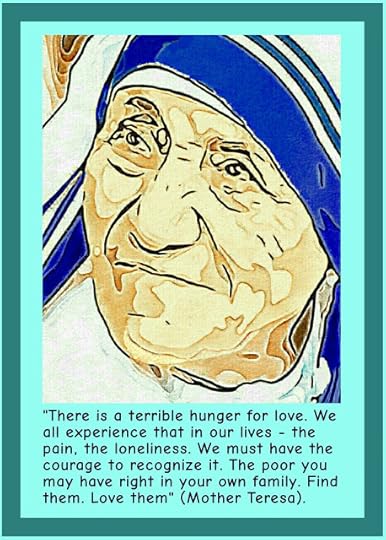

Published on September 05, 2020 16:40
September 4, 2020
"Nurture in Us What is Good"

I wanted to take note once again of another very rich "Collect Prayer" from the Church's liturgy (it's too easy to miss the content of these prayers from Sundays and the days that follow during the week).
This is from the 22nd Week of Ordinary Time in the liturgical calendar of the Roman Rite, a week which ends on Saturday, September 5. Here again we find several basic facets of our relationship with God expressed and interconnected in a concise plea for His grace.
We could benefit from praying and meditating on these words personally any time of year, and it might be useful to have a book that "collects" the Collect Prayers, especially the series from the six month-or-so period after Pentecost. This is the longest continuous stretch of Ordinary Time in the liturgical year, lasting until Advent begins the new annual cycle.
The first half of the Church year is strongly marked by preparations and celebrations of the birth, life, death, and resurrection of Jesus: Advent and Christmas, Lent, Holy Week, and Easter with its season culminating in the great feast of Pentecost.
However, we should not grow inattentive or distracted after the Easter Season ends. The fire of the Holy Spirit continues to illuminate the weeks and months that follow, so that this "Ordinary Time" (which does not mean "down time" or "insignificant time") represents the continuation of Pentecost. In these weeks, especially, we implore the Lord to strengthen and bring to fulfillment His grace that He has given us through Jesus Christ, in the Holy Spirit.
Consider our prayer over this past week:

This is a prayer full of the awareness of our dependence on God and our confidence in His tenderness and goodness, in His fatherly care for us whom He has made His children.
God is the " giver ," the Source of all goodness, and He calls us to know Him and love Him in Christ, to call Him by name - "Abba, Father" - with the love and grateful reverence of children. This is how we begin, even now, to share in God's own life that He has opened up to us through Jesus in the Spirit, the inexhaustible life of the Trinity, of the God who is Love.
Note again that not only does God give us this vocation. He also gives us the power, the expansion of freedom, which carries our response to His calling and our cooperation with it as we journey in faith, hope, and love to our fulfillment. He gives us His life, His goodness, in which we are destined to share.
In this prayer, we ask for Him to work the great mystery of His wisdom within us. We ask Him to " put into our hearts " the love of His name, and to " deepen " our awareness of His awesome and wonderful reality, His infinite goodness. Then we ask Him to " nurture " the goodness that is this new life in Christ, to watch over, care for, and " keep safe " this life that has been poured forth into our hearts through the grace of the Holy Spirit.
We ask the God who is Love, with what is truly "filial" (childlike) confidence and affection, to continue to foster - through the ongoing work of the Holy Spirit - the growth of that new life in the Risen Jesus Christ which is the "beginning" of our eternal destiny. We ask Him to strengthen this "belonging-to-Him" which is our good , to draw us and care for us along the mysterious journey of our growing-in-Him, and to "keep safe" this life He has nurtured, until it reaches its fulfillment.
God is so good! He wants so much to love us and give Himself to us. Even if we feel dead as a stone, He wants to transform us into His sons and daughters, and heirs to the Kingdom where His love will be all, in all (see 1 Corinthians 15:28).
And when we begin to ask Him to give us what we can't give ourselves, it is because His love is already at work in us.
Published on September 04, 2020 12:22
September 3, 2020
"Full Moon in September"
Published on September 03, 2020 18:35





